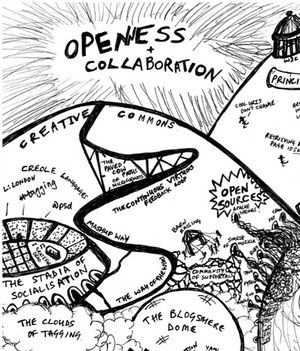on openness
published on'If you don't like change you are going to like irrelevance even less'
Notes and reflections on the Openness panel @ the DEHub Summit.
There was quite a lot of talk around Open Education REsources (OER) at the event so it was good to see this panel focusing more broadly on openness in general.
Terry Anderson began by speaking on 'open scholars' who he said:
- are transparent with a key critique element
- self archive
- do open research and openly apply research exposing the learning that happened
- filter and share with others
- support emerging open learning alternatives
- publish in open journals
- assign open textbooks
- induce open students
- teach open courses
- build networks
- are change agents
Rory McGreal reminded that one third of internet connectivity in the world is ONLY via mobile devices and that our current model of elite education is simply not sustainable:
- a balancing act is needed between bandwidth and performance etc
- fluid design is needed to enable displays for different screens etc
- OERs include games - titanic, mudball wall..
He asked how do we recognise what people learn on their own?
Don Alcott reminded that nothing is 'free' - so who does the work? who funds OER? - and stressed difficulties in a climate of competition and closed learning organisations.
Grainne Conole stressed the need to move from a focus on content and resources to practices, activity and use in open education (hear, hear!). Shae introduced her projects based in cloudworks and asked:
- If learners and their context have changed, we need new approaches to L&T. How can we harness sophisticated tools and OERs
- What are the quality implications?
- Will a focus on OER practices lead to improvements in quality and innovation?
- Will openness enable or restrict social inclusion?
I've pondered the last point myself for years.
Are we producing an elite group of learners?
The assumption that any potential learner is capable of finding, filtering, engaging with OERs and establishing connections is unfortunately absurd. So what is needed to support this - community OER mentors and Govt funding/resourcing?

[CC FlickR image shared by Paul Downey]